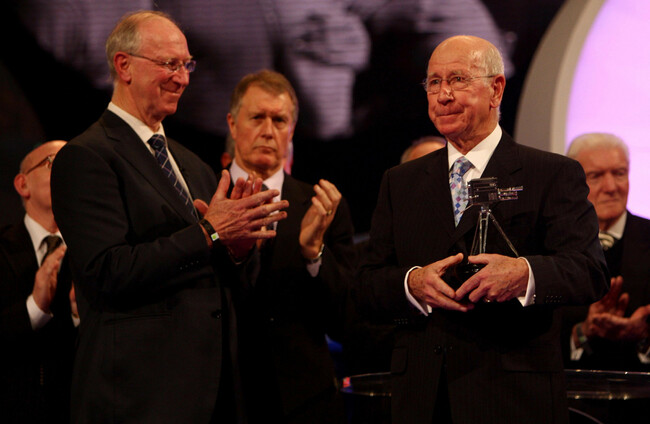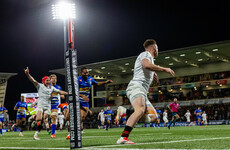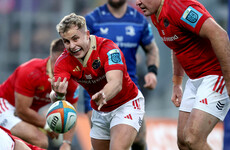THE ODDS of a family producing one legendary footballing figure are slim enough, but to produce two is almost unheard of.
Bobby and Jack Charlton may not be the only World Cup-winning siblings (West Germany’s Fritz and Ottmar Walter also achieved this feat in 1954), but they were both revolutionary and transcendent in their own ways.
Bobby is widely regarded as one of the greatest footballers that ever lived — many people who saw him play believe he deserves to be mentioned in the same breath as the likes of Pele, Diego Maradona and Lionel Messi.
Meanwhile, even looking beyond Jack’s considerable accomplishments as a player, there is a strong case to be made that he is the single most important and influential figure in the history of Irish football, achieving unprecedented success as manager of the national team, guiding them to two World Cups and one European Championships — an incredible run unmatched by any of the country’s coaches before or since.
Both were also key players in some of the most significant footballing events of the 20th century — the Munich Air Disaster, England’s ’66 World Cup win, Man United’s European Cup triumph and at least from a purely Irish perspective, Italia ’90.
The idea of using these two remarkable individuals as a lens with which to view the society and culture of their times was one of the driving forces behind Jonathan Wilson’s new book ‘Two Brothers’.
“To be honest, it wasn’t actually my idea,” the author and journalist tells The42, when asked about the book’s origins. “I had been struggling to get a couple of ideas off the ground. I was playing cricket in an authors-v-publishers match.
“I was moaning to the umpire about how I couldn’t get anybody to take on one of these two, what seemed to me to be great ideas.
“And a couple of weeks later, he got in touch with my agent, saying: ‘Would he fancy doing a book on the Charlton brothers?’
“And at first, I thought: ‘Well, surely there’s been a lot said about them.’ And then the more I thought about it, I thought actually there is more stuff there. It’s a couple of decades on from Leo McKinstry’s book, which is very good. But that looks at them as characters and as people. And I thought what there isn’t really is a book placing them in historical context.
“And I think that’s something that we’ve seen over the last 10 or 15 years change certainly in British sports publishing, that there’s much more of an acceptance that sport is a sort of cultural mode to be taken seriously, in the same way that you’d happily write about say, The Beatles, and how music influenced the ’60s and various social changes.
“I think we now accept that football, and sport more generally, also has that reach and influence. So I thought, there’s definitely a lot to be written about the ’60s, about the World Cup win, about Manchester United’s European Cup win, about how that Leeds side changed perceptions. The coming of Match of the Day in 64-65, which I think really is what catapults football onto a much bigger stage. And then the more I thought about it, the more I thought it would be nice to go back to the northeast. Obviously, I’m from Sunderland, Ashington is 45-50 miles north.
“I think their two lives trace the changes in those pit villages from being really a thriving place. The miners were impoverished and had pretty difficult lives, but there was a lot of public money, public investment in the welfare associations and public buildings.
“There was great local pride from the height of that in the ’30s when they were both born to what Ashington is now, which is this town that’s been hollowed out, the industry has gone, a very strong Leave vote in the Brexit referendum. What was a Labour stronghold, Ian Lavery (Member of Parliament for Wansbeck) now I think his majority is about 800, which would have been well over 20,000 20 years ago. And so I think tracing those social changes through them is a worthwhile project as well.”
So while their stories may already be somewhat familiar to many football fans, there is plenty of information in ‘Two Brothers’ that is either new or has been recontextualised.
“In terms of sort of the story, I knew Bobby had been managing Preston for two years. I knew they had been relegated, and they hadn’t got promoted the following year. And I just sort of assumed he drifted out of management but hadn’t realised all the politicking that led to him resigning, where it now seems that the Preston board didn’t want to be the board that sacked Bobby Charlton.
“So they used the sale of the centre-back John Bird to provoke him into resigning. Talking to people involved in that, it was fascinating piecing together this story from 45 years ago. So there’s that sort of thing, which was completely fresh to me and I suspect, a lot of people who aren’t Preston fans.
“I certainly hadn’t appreciated how late Jack came into the England team. He was 29 when he got his call up. And it came in April 65.
“So for my generation, people in their 40s now, who didn’t witness any of those players playing live, you have this image of that ’66 team, I obviously can rattle off the team and you recognise all the players, you know what they did, and you think of them as this perfect unit that always existed.
“But the fact that Ramsey even a year before was scrambling around trying to find a partner for Bobby Moore, it took me aback just how little time there was before the World Cup, and also how big the doubts were that people just didn’t really take Jack seriously as a player in ’65.
“It was much later in the ’60s, by which time he’s well in his 30s, that he starts to enjoy success. So the World Cup is the first medal he wins. He’d been promoted with Leeds, but that’s the first time he wins something, which is an astonishing thing.
“And so while the stories are quite famous, you realise they hadn’t quite been told right. The context has been forgotten.
“There’s a friendly in ’69 to celebrate the investiture of Charles as Prince of Wales, between Wales and the rest of the UK. And Bobby and George Best both play for the rest of the UK.
“They take the train back to Manchester and as Bobby’s getting off at Wilmslow, Norma, his wife and the kids are away and he says to George Best not really expecting him to say ‘yes’ to the idea: ‘The wife and kids are away, do you want to come to mine for dinner tonight?’
“And Best goes along with him and Bobby cooks the frozen scampi. Best then quizzes him about domestic life and what it’s like to be married. ‘Who does your garden? How much does that cost? You have a cleaner?’ All that kind of thing.
“And the way that story is usually told is: ‘If only Bobby had been more successful in selling the idea of marriage to George Best.’
“But the truth is, the following week Manchester United play a friendly in Copenhagen. George Best meets a Danish Girl and he proposes to her almost immediately.
“The problem is actually Bobby sells the idea of marriage too well and then the proposal becomes one of the great Best stories. They’re engaged for about about three months, the girl Eva Haraldsted then sues over breach of contract [after the engagement ends].
“This then leads to a whole series of ugly incidents, there’s a fight in a club, George Carman [becomes involved in the case] the great QC who ends up defending Jeremy Thorpe, the former Liberal leader when he was accused of conspiracy to murder. He defends The Guardian in the libel trial of Jonathan Aitken in the mid-’90s. One of Britain’s more famous lawyers in the second half of the 20th century. Best ends up having an affair with his wife, and then a couple years later when they rekindle that affair amid another legal case, Carman threatens to have a gangster break his legs and fortunately for Best, the gangster is a Manchester United fan and if anything happens to him, he says: ‘I know what’s going on and don’t do it, because it’s going to be much worse for you [if Best gets hurt].’
“It’s such a bizarre story. But the thing that ignites it is actually the opposite of what everybody thinks, it’s Bobby selling the idea of marriage too well.”
One of the most fascinating aspects of the Charltons’ story is that while both made an enormous contribution to their profession, that is ostensibly where the similarities end. Certainly, as people, their respective temperaments contrast starkly, while their conception of football was also markedly different. Bobby was an introvert who saw the game as being all about great moments of skill and individual brilliance. Jack was an extrovert far more interested in tactics and the collective aspects of the sport. The brothers’ upbringing and trajectory into football perhaps partially explain their radically different visions of how it should be played.
“From a very young age, it was obvious to everybody that Bobby was going to be a professional footballer. He came from a footballing family, they all knew how good he was, and he was always very confident in his talents.
“He talks a lot about how when he first gets to Manchester United, he can’t make that final breakthrough into the first team. That was the first time he began to doubt himself.
“Whereas Jack really had no sense of himself as a footballer, to the point that when Leeds offer him a trial, Cissie the mother says: ‘No, you’ve got the wrong one. You mean, Bobby.’ And they say: ‘No, no, we want the big one, the defender.’
“I think Bobby, because of his own talent, has got this very old-fashioned view of football being about individualism, glory, dribbling and about brilliant, long-range shots, which is what his game was all about.
“And in Busby’s Manchester United side of the late ’50s, that is how they played, and they played it brilliantly. In the last two games before the disaster in ’58, they win 5-4 at Arsenal and draw 3-3 away against Red Star in Belgrade.
“But what then happens after Munich and probably as a consequence of Munich, at least to an extent, is that that rarifies in Bobby’s mind the idea that this is what real football is. And that 18 months, two years before Munich, when he’s in the first team when he’s playing this brilliant, exciting, attacking, successful football with his mates, he talks about that as paradise. And I think he spends a lot of the rest of his career trying to get back to that.
“And of course, football moves on. And Busby doesn’t really. I mean, he moves on a little bit, but there’s that great line from John Aston, who was the man of the match in the ’68 European Cup final. He describes that success as being like ‘the last man to win Wimbledon with a wooden racket’. They’re playing in a very old-fashioned way.
“And who’s there at the vanguard of a new wave? It’s Jack with Leeds and Don Revie. And Jack from a very early age started going to coaching courses, which Bobby always thought were a waste of time. Jack was fascinated by football as a system, fascinated by tactics and far less interested in the individual ability of his players and that I think suited his temperament absolutely.
“He always liked to make a bit of money on the side, but when he was a kid, he realised that the paper routes in Ashington were totally incoherent, they were all over the place.
“And so he sat down with a map, and he traced them out. And he rationalised it so that every paper boy could take half an hour off their round every day. And he took a little cut from everybody.
“That shows a), his leadership, to get all these other paper boys to buy into his grand new plan. And b), his great organisational brain. He could see what the more efficient way of doing it was.”
The brothers’ conspicuous differences are also illustrated by how they react to success in the moment. Essentially, Jack lapped up these triumphs and invariably seemed assured on joyous occasions in front of a big crowd.
Yet there was often a sense of uneasiness about Bobby in similar circumstances. As Wilson writes: “He was not somebody to whom euphoria came readily.” Even during his greatest moments in the game, the Manchester United legend’s joy was not unconditional.
“I guess if you have great talent, maybe you feel great pressure and the reaction is one of relief. But clearly, that is magnified by Munich. He talked about after the ’63 FA Cup Final, which is the first thing United win after Munich. Him and Bill Foulkes, one of the other survivors, sort of drifted away from the celebrations pretty quickly, saying: ‘We were just thinking of the lads who weren’t there.’
“And obviously, by ’68 when they’re winning the European Cup, that sense is magnified greatly. And even after the semi-final, Bobby couldn’t go to the bar afterwards and have a drink. He felt exhausted. Every time he tried to stand up, he just collapsed.
“So when they beat Benfica in the final in ’68, he ends up just lying on his bed in the hotel room. Norma, his wife, goes to the party, has to apologise and says: ‘Bobby can’t make it.’ So I think that’s understandable as sort of a reaction of grief to that trauma of ’58.
“What’s interesting, though, is that he didn’t really seem to feel any great joy in ’66, either. Whether that was pressure knowing he was certainly the best-attacking player in the England side, knowing the expectations, knowing that his eight years he’d been playing for England building to that moment. I think he felt an odd sense of dissatisfaction after that final as well because his role had been very different. In the semi-final against Portugal, he’d scored both goals and there’s a brilliant photograph on the back of the Mail the following morning of him and Jack hugging each other, and huge beaming smiles on their faces.
“Whereas in the final, there’s that photograph taken from the back of the stand. And there’s something covering the bottom left corner of the shot, you can’t quite tell if it’s a shoulder or a flag. But it almost increases the sense of intimacy, the fact that it’s clearly shot through other people, and the two of them, kneeling on the ground, hugging each other, that’s a really poignant image.
“But again, I guess because he’d only been in the team just over a year, with Jack there’s this sense of incredible joy: ‘Who can believe that I’m here?’ Whereas Bobby had built to that all his life. And maybe he was thinking of people like Duncan Edwards and Tommy Taylor, who probably would have been in that side had it not been for Munich.”
Ultimately, it seems the ’66 World Cup marks a watershed both in their lives and their relationship with one another. It represents the point that they are most unified, when their bond is the deepest and before their journeys in life increasingly begin to diverge. A rift forms subsequently and their relationship is never quite the same again.
To a degree, it is perhaps inevitable. Jack experiences the success as a manager that eludes Bobby in his brief Preston stint. The latter ultimately focuses his energies on a role as a director at Manchester United among other responsibilities. Consequently, as they grow older, they have increasingly little in common and are often in different parts of the world. In a way really, it is the fate of most siblings, although there was genuine conflict at times too.
“It’s the issue with Norma, Bobby’s wife,” explains Wilson. “It manifests pretty quickly after the final of ’66 — the following month, there is a parade put on near Ashington where they go in an open-top Rolls Royce from a house on Beatrice Street to the town hall.
“And Bobby turns up very late. And he said it’s because he’s ‘too anxious about the crowds’. But there’s clearly suspicion on the part of Jack, Cissie and Bob, the father, who was very quiet and his opinions tend not to have been recorded, whereas Cissie couldn’t keep herself off the TV, or out of the papers.
“But I think there was a sense on the part of the family that Bobby, with Norma in tow, just felt uncomfortable in the family home. It’s not a case of blame. It’s just one of those things that sometimes happens in families.
“Norma had worked at a modelling agency and clearly was part of that first generation of women who thought they should have careers and were sort of pioneering in that feminist way.
“The rest of the family were pretty traditional [with regards to their perception of] the role of women. There’s a documentary that Jack presented in 1971 (see above) where he goes back to Ashington.
“It’s an amazing documentary, partly because he’s so comfortable in front of the cameras. It’s like watching a modern YouTuber or something — the directness with which he just speaks. He goes back to what’s become of the family home, which he bought from his World Cup winnings.
“He, his father Bob, and one of the younger brothers have Sunday dinner together. Cissie just brings it in for them, and she disappears back to the kitchen. And there’s no sense that women should eat with them.
“And then Jack talks about how: ‘I don’t think women should have a job. I think their job is just looking after their husbands and making sure that everything’s right for them.’
“And because he was a very open, inquisitive, intelligent bloke, I’m sure in time, he probably did amend that view. You see when he goes to the blitz club in that documentary in the early 80s, how open he is to new ideas.
“But that’s the background he’s coming from where the mother didn’t sit down for Sunday dinner with him. She was just there to put the food on the table. And Norma was from a very different world, a different background. She was much more middle class.
“You can imagine Jack as a house guest would be pretty untidy, probably quite an annoying guest to have. And so you can imagine there would possibly be friction there if Norma was very house proud.
“One of the things that caused the rift in the family, there’s a story about Jack and Bob, the father, and one of Jack and Bobby’s uncles going to visit Bobby in Cheshire. And Bobby, saying: ‘Oh, we’ll put you up in a hotel. We’ve got a decorator in, there’s not really any room.’ And the implication is that they didn’t have the decorator in. It was just an excuse because he didn’t want them staying with him.
“I have also put my family up in a hotel because I didn’t want them staying in the same place as me. Maybe that makes me a terrible son. But I just sort of think the flat’s not that big and we’re going to wind each other up if they stay here. ‘If I can afford to pay for you to go to a hotel, I think we’ll both be happier.’
“But if your parents come from a very traditional working-class home in the Northeast, where people are used to sharing rooms and sharing space, maybe that does come across as being a little bit cold, a little bit distant.”
On Bobby Charlton’s birthday, a clip of brother Jack presenting his award at SPOTY.
— A Funny Old Game (@sid_lambert) October 11, 2020
Oh my. Time to go out for a walk, I think.pic.twitter.com/WvhhldLh8A
And while Wilson writes that the Charlton brothers were “never fully reconciled,” the last indelible image in the public consciousness of the pair together is one of poignant reunion.
At the 2008 BBC Sports Personality of the Year Awards, Jack presents Bobby with a lifetime achievement gong. Both are clearly emotional. The simplicity of Jack’s short speech makes it no less moving.
“When we were kids, and we used to go to the park and play, I would go home for dinner and he’d stay on and play.
“Bobby Charlton was the greatest player I’ve ever seen. He’s me brother.”
“What that showed was that there was no sense of they hated each other,” adds Wilson. “You know? They just didn’t really get on. And I think they just drifted apart because they did different things.
“When Jack was on Desert Island Discs in ’96 and [the show's presenter] Sue Lawley asks him about the relationship with Bobby, he says: ‘Oh, you know, maybe if he’d been a manager for 20 years, we’d have had a lot to talk about.’
“So you get the impression from that, it’s not there’s been some irreconcilable rift. It’s just that Bobby’s not going to visit his parents. And particularly when his mother was ill late in life, I think that was hurtful to Jack. But it wasn’t some sort of row that could never have been got over.
“I think they just didn’t move in the same circles anymore. And what you see from that Sports Personality clip is that there was still a lot of love mutual love and respect there. And it wasn’t that they couldn’t be in a room without rowing, it was just that they had taken different paths. And those paths end up in quite different places.”
‘Two Brothers’ by Jonathan Wilson is published by Little, Brown. More info here.
















What a cool guy probably the most likeable flighter in mma or boxing